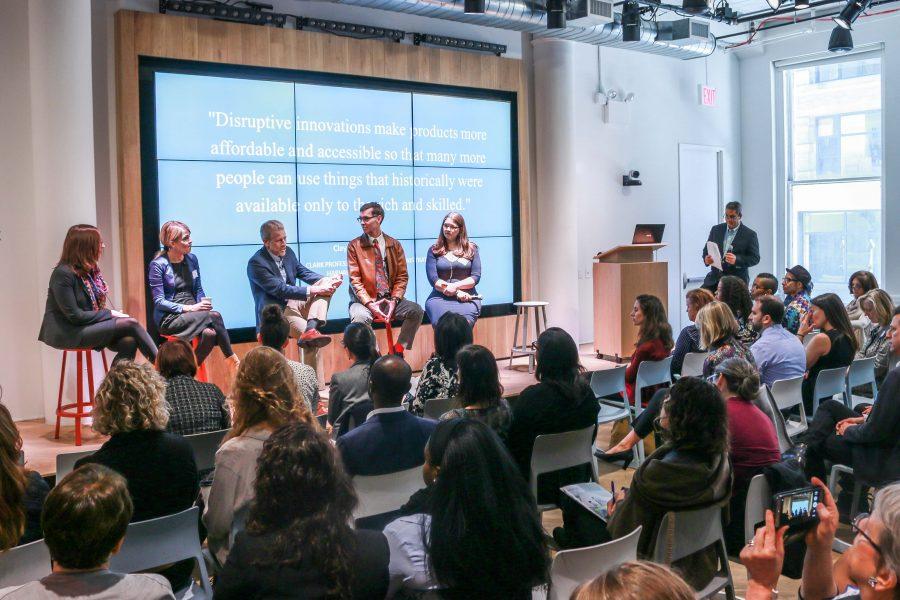Can Big Corporations Be More Socially Responsible?
Deborah Goldfarb, Patsy Doerr, Whitney Tilson, Daniel Rabuzzi and Lauren Locke, speaking at NYU Alum David Dosamantes’ panel on Corporate Social Responsibility in an Age of Disruption.
April 19, 2017
How can companies take social responsibility while still maintaining profit? An April 10 panel called “Corporate Social Responsibility in an Age of Disruption” headed by NYU Wagner alum David Dosamantes, founder of consulting agency Panorama Impact, addressed this vital question.
“There are individuals, companies, start-ups, non-profits, civic innovators who are redefining profit to a new human-centered place of innovation and societal profit,” Dosamantes said during the panel.
The panel consisted of five speakers: Whitney Tilson, founder and managing partner of Kase Capital Management; Patsy Doerr, global head of corporate responsibility and inclusion at Thomson Reuters; Daniel Rabuzzi, executive director of Mouse; Deborah Goldfarb, managing director in citizenship and reputation at Barclays; and Lauren Locke, head of East Coast brand partnerships at Grindr. All had their own share of opinions regarding Dosamantes’ and the audience’s questions.
“I think there’s an enormous tension out there where corporate America has changed a lot, particularly in public companies,” Tilson said.
According to the panelists, there has been a lot of pressure on CEOs and companies to cut costs and increase their bottom lines and stock price while still maintaining corporate responsibility. However, capitalism does not always win, as seen by the unravelling between 3G and Unilever.
“I am running what we call the global corporate responsibility and inclusion but what it actually means is sustainability, diversity and [corporate social responsibility],” Doerr said in response to Dosamantes’ question about how the company is staying relevant in corporate social work.
Reuters started with a program to build diversity and inclusion, which impacted engagement, customer loyalty, productivity, innovation and the bottom line. He also built sustainability and CSR into its mission to cause disruption within the community. Other companies are taking similar measures.
“[Barclays] is investing in green companies that are interested in scaling up and creating 500 new jobs in the next five years,” Goldfarb said. “So Barclays is actually trying to drive growth by investing in business models that are sustainable.”
Goldfarb also emphasized that companies need to utilize millennials’ entrepreneurship in innovative social ideas. To do this, Barclays brings groups of millennials together to share and pitch their ideas in a competitive environment. This tapping into young people’s talents drives business forward.
“In some of the countries Grindr is in, it’s illegal to be gay. So the social justice issues are very obvious to us,” Locke said. She explained how her colleagues at Grindr would visit countries such as Greece and Uganda to help the LGBTQ communities and refugees trying to make a new life for themselves.
“There’s demographic disruption and there’s digital disruption,” Rabuzzi said. “We are preparing our young people. At Mouse, we work primarily with middle schoolers, those who are eligible for a reduced lunch.”
Rabuzzi went on to say that technology is here to stay and are huge sources of disruption that we don’t understand just yet. In a fast-paced market, it is the responsibility of companies such as Thomson Reuters, Barclays and Mouse to keep up to speed.
Email Han Wang at [email protected].



























































































































































